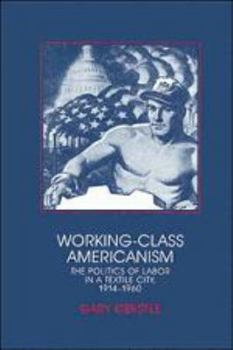Working-Class Americanism: The Politics of Labor in a Textile City, 1914-1960
Select Format
Select Condition 
Book Overview
In this classic interpretation of the 1930s rise of industrial unionism, Gary Gerstle challenges the popular historical notion that American workers' embrace of "Americanism" and other patriotic... This description may be from another edition of this product.
Format:Paperback
Language:English
ISBN:0521424615
ISBN13:9780521424615
Release Date:July 1991
Publisher:Cambridge University Press
Length:368 Pages
Weight:1.10 lbs.
Dimensions:0.8" x 6.0" x 8.7"
Customer Reviews
1 rating
Americanism as a fluid language
Published by Thriftbooks.com User , 20 years ago
Working-Class Americanism, written by Gary Gerstle, is a truly fascinating and inspiring book. He focuses on the early-twentieth-century Woonsocket, Rhode Island, a city of textile industry and habitated mainly by French-Canadian immigrants from Quebec, Canada. Most of residents in the city were French Canadian, but there were other residents, especially Franco-Belgians. The culture of French Canadian workers was community-centered, devoted to Catholicism, and French language. On the other hands, workers from France or Belgium were radical, or socialistic, social democrats. Gerstle analyzes the process hoe these two working-class groups of diffenent culture and ideology made (and broke later) tenuous alliance under the Independent Textile Union (ITU), an CIO-affiliated labor union. The author's innovative approach to the labor history of Woonsocket is his usage of the concept of Americanism. He treats Americanism as not as a consistent and monolithic ideology but as a fluid language which is open to appropriation by various social groups and individuals. In his view the language of Americanism consists of several dimensions---nationalistic, democratic, progressive, and traditional. He argues that in the severe economic condition of the Great Depression two different working-class groups succeeded in establishing the strong labor movement of the ITU by using the nationalistic, democratic, and progressive dimensions of Americanism in order to articulate their rights as workers. Gerstle's treatment of the labor Americanism is very subtle and sensitive. He does not insist that the discourse of Americanism could have assimilated French Canadians and Franco-Belgians into one monolithic Americanized group of citizen-workers. He points out that whereas Franco-Belgian radical labor leaders embraced a dream of remolding America thoroughly in terms of social democracy, French Canadian workers accepted Franco-Belgian leadership in the ITU as an instrument to reinvigorate their ethnic community and family (Gerstle points out the patriarchal nature of French Canadian working-class culture). French Canadians and Franco-Belgians allied without a common vision of American society. As a result, he suggests, they abandoned the alliance based on the ITU when local Republicans, after defeated by Democrats in the late 1930s, solicited French Canadian workers by giving favor to their ethnic culture. The author's unique approach to Americanism makes Working-Class Americanism interesting both as social history of labor and political history at the same time. Gerstle has succeeded in discovering multi-faceted and complicated experiences of Woonsocket textile workers and their politics of language by wide and intensive research including interviews. The interviews make his book highly vivid. For example, he proves the ITU's commitment to democratic delibaration by description of an interview with a old-aged ex-labor activist, who showed the author his "highly




